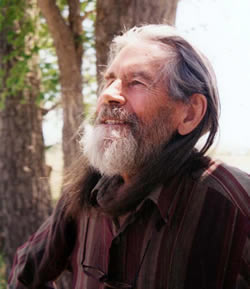 |
||||||
|
|
New offensive in the Italian Appenines, G company, 86th Mountain Infantry in reserve. We knew that later in the day or the next day or so, we would be moved from reserve to point. A little dark snake crossed my path, disappeared. I wanted to join that snake, live its life, slip away into survival. This strange, but real, fantasy, lasting two seconds at most, had nothing to do with being human; it had everything to do with staying alive. My regiment was no longer a bunch of green innocents; we had been present at violent deaths of comrades; we had walked silently past a grieving Italian farm woman standing by the stiff, ashen body of her husband; we had dug countless foxholes, racing like frantic woodchucks against the next artillery attack. Back home magazines and newspapers trumpeted that there were no atheists in foxholes. Please file that under "creative non-fiction." Yes, some soldiers pray. Once a devout Catholic urged me to go with him to a service in an Italian church. I told him I was not a Catholic. He said that didn't matter. He kept at me, so I went. But you don't dig foxholes to have a place to pray. You are totally focused on the next artillery round, the German 88 or the American 105 (friendly fire). You don't speak, you don't whisper, you listen. You are one with the air. The company took a break. My squad found a cozy shelter in an abandoned enemy dugout. We found a loaf of bread, heavy, tough, dark, welcome change from K and C rations. Someone said, "I don't want to die." There was no answer to that. From a letter in the Plattsburgh /Press-Republican. "Until Americans understand that war is never winnable we will continue to act as the world's police force, using our children as fodder for causes that can only be solved through dialogue, understanding and compromise." Signed, James Lundy, a veteran, Chazy, New York. From the War Between the States, 1861-1865. "Some with their entrails torn out and still hanging to them and piled up on the ground besides them and they still alive. Some with their underjaw torn off, and hanging by a fragment of skin to their cheeks and their tongues lolling from their mouth, and they trying to talk .... And then to see all those dead, wounded and dying horses, their heads and tails drooping, and they seeming to be so intelligent as if they comprehended everything." (1) When I left that last steep ridge .... didn't make it to the top ... I found our squad's BAR man terribly wounded. I looked for a medic, found one, started to lead him to the wounded man. "I see where he is," the medic said, "you go on, take care of yourself, and you won't need that any more." He was pointing to my M1. Only then did it sink in, I was out of it. I watched the medic go to my badly bleeding foxhole comrade, then found a rock to prop my rifle against, didn't want it to get it dirty.. I'd carried that damn weapon in the snows of Colorado and the heat of Texas and used it in the mountains of Italy. This is embarrassing, but I have to admit that leaving that rifle was wrenching. Sure, I was happy to be alive, but without a rifle I felt truly bereft. That lasted for maybe ten seconds, a little more than that crazy notion of becoming a snake.. One more strange thing, and then I'm through confessing. It was nearly dark when I regained the ridge from which we had jumped off into that narrow little valley and then up slope. Big trees, probably chestnuts, silhouetted against a darkening sky, like witnesses. They spoke to me. No, of course they didn't, but they sent a message. "We have nothing to do with this. It's a human affair." I joined two other walking wounded, left my squad, my platoon, good old miserable G Company, 86th. Now, a witnesss to endless war, I recognize truth when I read of wounded vets from Iraq or Afghanistan wanting desperately to rejoin their units. Here's what another GI wished he had said when asked to speak about war: "We are here today because we survived and we survived for many different reasons. A few of us survived because of skill or bravery, but most of us survived because, through no fault of our own, we were never sent where a bullet or bomb might kill us .... We should be thankful for our good luck but also remember that merely surviving does not make us heroes." (unsigned letter) We also have to realize that walking away from combat does not make any of us instant authorities on world affairs. Also, each war has different sides to it, circumstances vary a lot, including casualty rate of each outfit. What combat vets have in common is that they return from the dark side of the moon, far, very far, from green pastures where generals write memoirs, where think tanks comment, where reporters report and especially where politicos like Hillary and Obama talk in generalities. One of my heroes was the cartoonist, Bill Mauldin, who was called up by pompous General Patton and told to quit drawing that strip for Stars and Stripes showing Willie and Joe as sloppily uniformed, woebegone sad sacks. Mauldin refused, went on drawing Willie and Joe the way they were, the way we were, ordinary humans caught in war. We loved that strip. Let's not be bamboozled by Bush's sneer, "cut and run." When we say "Bring the Troops Home Now," that's shorthand rhetoric too and it means "cut and run," the intelligent thing to do. Besides, those who desperately wish to cover defeat with "victory" can go ahead and declare victory: Saddam is dead, his regime in tatters. Probing a little deeper, we have to ask, "Well then, what keeps us there?" Our Decider-in-Chief keeps death busy over there for Oil and Empire. That's the reality, corporate-political-governmental domination. Profit and power, hard to tell which comes first. Pronouncements in the word-war are cover-up propaganda, for home consumption. Do world rules realize that war is a system reaching into other systems, such as global warming, extinction of species, injustices all over the world. War is not something you turn on and then off. The whole thing is just too monstrously big and unpredictable for generals and presidents and prime ministers to handle. It has long, very long, consequences. Consider this: In the Philippines the Moro people have carried on guerrilla war, off and on, for generations, from the opening of the twentieth century. Outraged memories of racist slaughter by the U.S. Army at the end of the Spanish-American war. Terrorist pacification. Today the Moros are still at it, fighting back guerrilla style, though we and the Philippean dictator have bestowed a new name on them: Terrorists. Most of the thoughts I've been putting down here are "extremist." Sure, but notice what we're talking about. We're talking about domination by a minuscule fraction of humanity, in our name, a fraction that sets itself up to decide the fates of all others. The word "all," that's extremist too, and I mean it, because peoples everywhere are affected by this insane (another extremist word, and I mean that too) all-out shock-and-awe death dealing. I suggest we square off and lock horns with that reality. Well, big surprise, our rulers clearly prefer their contemptuous treatment of lives, and they are using every horse in the barn to convince us to "stay the course." What's the cost? What, for example, does depleted uranium weaponry do to our troops, and to all of us when uranium dust gets into wind currents that have traversed the globe from time immemorial, indifferent to boundaries between peoples, between states, between the rich magnate's energy-inefficient mansion and the low-wage neighbor in the next township. The answer stares at us, a granite stare, right up close. This war thing has no "safe" or meaningful position in "the center," where appeals for bi-partisanship ... same thing, centerism, wavering on the fence ... abound. Jim Hightower of Texas reminded us, some time ago, that the center is nothing but yellow stripes and dead armadillos. What can we do? We can get down on the ground, smell the dirt or sage or grassland, build an opposition that does not shrink from standing up, an opposition that doesn't fear stupid labels like "extremist." Because that's where we actually are, on the far edge. The way out is to turn 180 degrees away. We need breathing space. We need happiness in resistance. We need a joyful turn from killing to curing. The earth requires healing of its many wounds. While we're at it we might kick out distorted images of what it is to be a man, of what it is to be a woman. In the immortal words of the song by Florence Reese, "Which side are you on?" 1., Roy Blount, Jr.,/At the Front, 1861-1865/. Anderson Valley Advertiser, July 25, 2003. NOTE: Martin Murie was seriously wounded in April 1945 and lost the sight in his right eye. He also lost many of his best friends forever. For the last 60 years, Martin has been a dedicated advocate for peace...JS |
|||||







 A
World War One veteran with a hook for a hand was invited to talk to
my grade school class. He showed us a helmet, didn't
say much, but we were fascinated by the hook. That war was a hellish
slaughter: over the top, bayonets fixed, to die in mud as European
states tangled with each other for empire status, colonies in Africa
and Asia. Trench warfare ended on Armistice Day and war went on, Europe
and the United States intervening in a vast internal struggle in the
new Soviet Union, Reds against Whites. In 1934 Italy went fascist,
a forced harnessing of corporate and governmental power to refashion
the state. To do that, it was necessary to repress internal dissent.
Then Germany, Hitler in charge. Civil war broke out in Spain, Reds
against Fascists. Fascist Italy invaded Ethiopia. Japan, already masters
of Korea and Taiwan, invaded Manchuria, then China. The U.S. annexed
Hawaii. What did World War One and its massive collateral reverberations
do for humanity? It set the stage for World War Two. Gradually I learned,
and there were plenty of teachers, even in remote Jackson's Hole, that
our land had enemies, homegrown commies and fellow travelers, spying,
taking advantage of our open society, our freedoms. Something had to
be done. Something had already been done, by Federal Attorney General
Palmer who in the nineteen twenties launched a search-and-export drive
against immigrants, most of whom were impoverished, fleeing from rough
economic downturns in war-ravaged Europe, equally poverty stricken
in their new home. Many of them turned toward union organizing and
other unacceptable projects. The Palmer raids swept up thousands, put
them on boats, sent them back to where they came from. Out of the inner
workings of that turmoil emerged an investigative agency, Federal Bureau
of Investigation, J. Edgar Hoover in charge. Later, by one of those
quirks of history we found ourselves allied with the Soviet Union against
the Nazis. The Red Army Chorus made a triumphal tour across our land.
Corporate power brokers and their media flacks didn't like any of that
one bit, The mean, gutter propaganda barrage directed against Roosevelt
and Eleanor, and their dog, Fala, went on, and on, unrelenting. Our
high school principal used generous chunks of class time to rail against
the government and "that man in Washington." Fascism and
war brought horrendous holocausts for European Jews, Communists and
Gypsies, for soldiers, for civilians trapped in air attacks on cities.
Hitler changed tactics, sent his tiger tanks east against the Soviet
Union. This was, at last, the option most favored among many of Jackson's
leading citizens, but it didn't go the way it was supposed to. It ground
down into a terrible winter stalemate and then the Soviets turned from
retreat into offense, won decisive battles with huge tank battles and
massive losses. American losses were high too, but nowhere near the
grand total of deaths -- millions upon millions ... from Leningrad
in the east to the Lowlands and France and Britain in the west. What
did World War Two do for us? Laid the groundwork for the Cold War.
Actually, it was hot. The war in Korea, pompous General MacArthur in
charge, was essentially another intervention in a civil war, North
Korea, Soviet influence and South Korea, U.S. influence. (That's a
simplification). Fifty four thousand Americans died, along with millions
of Chinese and Korean soldiers and uncounted civilians, victims of
the bombing campaign against North Korean cities. Other U.S. military
intrusions in the cold war era include the CIA-sponsored attempt on
Cuba (Bay of Pigs); invasion of Grenada; covert war in Nicaragua; invasion
of Panama. We "won" the cold war. More war followed: Iraq
I, Somalia, full-scale bombardment of Serbia. What did these do for
us? They prepared the way for Afghanistan and Iraq II. Over 3,000 of
our soldiers have died in Iraq, many more wounded. Iraqi civilians
too, a huge toll. What is this war doing for us? Laying the groundwork
for an attack on Iran? Venezuela? Cuba? We can quibble till the cows
come home about whether certain wars are worth fighting. But one fact
is clear, twentieth and twenty first century high-tech wars are clumsy,
dumb-bomb systems, their killings and woundings more indiscriminate
than ever before in the history of our species. That's one reason modern
war has no moral standing. Furthermore, the war hawks of today are
still on that age-old moth-eaten track, sending the poor and powerless
to kill and die for ever more outrageous demands by the rich and powerful
for control of Nature's "resources," and peoples' livlihoods
and ways of living. Examine, if you have time, post WWII history in
Asia where France and England mopped up Japanese resistance with one
hand, re-installed the same old colonial arrangements with the other.
Our government and military got in on that too, when we took over "custody" of
Indochina from France. Vietnam war. Cold War? Not hardly. Meanwhile
our home planet has been suffering under wholesale plundering, from
the southern regions where 12 penguin species are endangered to northern
regions where polar bears, woodland caribou and many others are threatened
with extinction. It's not global climate change alone. It's reckless
mining, lumbering, urban sprawl, chemical agriculture, plastic proliferation,
over-fishing, over grazing, acid rain, mercury contamination of the
food chain, crazy motorized recreation, lavish resorts for the rich,
underpaid temp jobs for workers, and more, lots more. You know all
this. Why repeat it? It bears repeating, that's why. But I have been
indulging in a lot of abstractions. I'm going to kick myself, gear
down to confessional mode, personal snapshots. ITALY. 1944
A
World War One veteran with a hook for a hand was invited to talk to
my grade school class. He showed us a helmet, didn't
say much, but we were fascinated by the hook. That war was a hellish
slaughter: over the top, bayonets fixed, to die in mud as European
states tangled with each other for empire status, colonies in Africa
and Asia. Trench warfare ended on Armistice Day and war went on, Europe
and the United States intervening in a vast internal struggle in the
new Soviet Union, Reds against Whites. In 1934 Italy went fascist,
a forced harnessing of corporate and governmental power to refashion
the state. To do that, it was necessary to repress internal dissent.
Then Germany, Hitler in charge. Civil war broke out in Spain, Reds
against Fascists. Fascist Italy invaded Ethiopia. Japan, already masters
of Korea and Taiwan, invaded Manchuria, then China. The U.S. annexed
Hawaii. What did World War One and its massive collateral reverberations
do for humanity? It set the stage for World War Two. Gradually I learned,
and there were plenty of teachers, even in remote Jackson's Hole, that
our land had enemies, homegrown commies and fellow travelers, spying,
taking advantage of our open society, our freedoms. Something had to
be done. Something had already been done, by Federal Attorney General
Palmer who in the nineteen twenties launched a search-and-export drive
against immigrants, most of whom were impoverished, fleeing from rough
economic downturns in war-ravaged Europe, equally poverty stricken
in their new home. Many of them turned toward union organizing and
other unacceptable projects. The Palmer raids swept up thousands, put
them on boats, sent them back to where they came from. Out of the inner
workings of that turmoil emerged an investigative agency, Federal Bureau
of Investigation, J. Edgar Hoover in charge. Later, by one of those
quirks of history we found ourselves allied with the Soviet Union against
the Nazis. The Red Army Chorus made a triumphal tour across our land.
Corporate power brokers and their media flacks didn't like any of that
one bit, The mean, gutter propaganda barrage directed against Roosevelt
and Eleanor, and their dog, Fala, went on, and on, unrelenting. Our
high school principal used generous chunks of class time to rail against
the government and "that man in Washington." Fascism and
war brought horrendous holocausts for European Jews, Communists and
Gypsies, for soldiers, for civilians trapped in air attacks on cities.
Hitler changed tactics, sent his tiger tanks east against the Soviet
Union. This was, at last, the option most favored among many of Jackson's
leading citizens, but it didn't go the way it was supposed to. It ground
down into a terrible winter stalemate and then the Soviets turned from
retreat into offense, won decisive battles with huge tank battles and
massive losses. American losses were high too, but nowhere near the
grand total of deaths -- millions upon millions ... from Leningrad
in the east to the Lowlands and France and Britain in the west. What
did World War Two do for us? Laid the groundwork for the Cold War.
Actually, it was hot. The war in Korea, pompous General MacArthur in
charge, was essentially another intervention in a civil war, North
Korea, Soviet influence and South Korea, U.S. influence. (That's a
simplification). Fifty four thousand Americans died, along with millions
of Chinese and Korean soldiers and uncounted civilians, victims of
the bombing campaign against North Korean cities. Other U.S. military
intrusions in the cold war era include the CIA-sponsored attempt on
Cuba (Bay of Pigs); invasion of Grenada; covert war in Nicaragua; invasion
of Panama. We "won" the cold war. More war followed: Iraq
I, Somalia, full-scale bombardment of Serbia. What did these do for
us? They prepared the way for Afghanistan and Iraq II. Over 3,000 of
our soldiers have died in Iraq, many more wounded. Iraqi civilians
too, a huge toll. What is this war doing for us? Laying the groundwork
for an attack on Iran? Venezuela? Cuba? We can quibble till the cows
come home about whether certain wars are worth fighting. But one fact
is clear, twentieth and twenty first century high-tech wars are clumsy,
dumb-bomb systems, their killings and woundings more indiscriminate
than ever before in the history of our species. That's one reason modern
war has no moral standing. Furthermore, the war hawks of today are
still on that age-old moth-eaten track, sending the poor and powerless
to kill and die for ever more outrageous demands by the rich and powerful
for control of Nature's "resources," and peoples' livlihoods
and ways of living. Examine, if you have time, post WWII history in
Asia where France and England mopped up Japanese resistance with one
hand, re-installed the same old colonial arrangements with the other.
Our government and military got in on that too, when we took over "custody" of
Indochina from France. Vietnam war. Cold War? Not hardly. Meanwhile
our home planet has been suffering under wholesale plundering, from
the southern regions where 12 penguin species are endangered to northern
regions where polar bears, woodland caribou and many others are threatened
with extinction. It's not global climate change alone. It's reckless
mining, lumbering, urban sprawl, chemical agriculture, plastic proliferation,
over-fishing, over grazing, acid rain, mercury contamination of the
food chain, crazy motorized recreation, lavish resorts for the rich,
underpaid temp jobs for workers, and more, lots more. You know all
this. Why repeat it? It bears repeating, that's why. But I have been
indulging in a lot of abstractions. I'm going to kick myself, gear
down to confessional mode, personal snapshots. ITALY. 1944